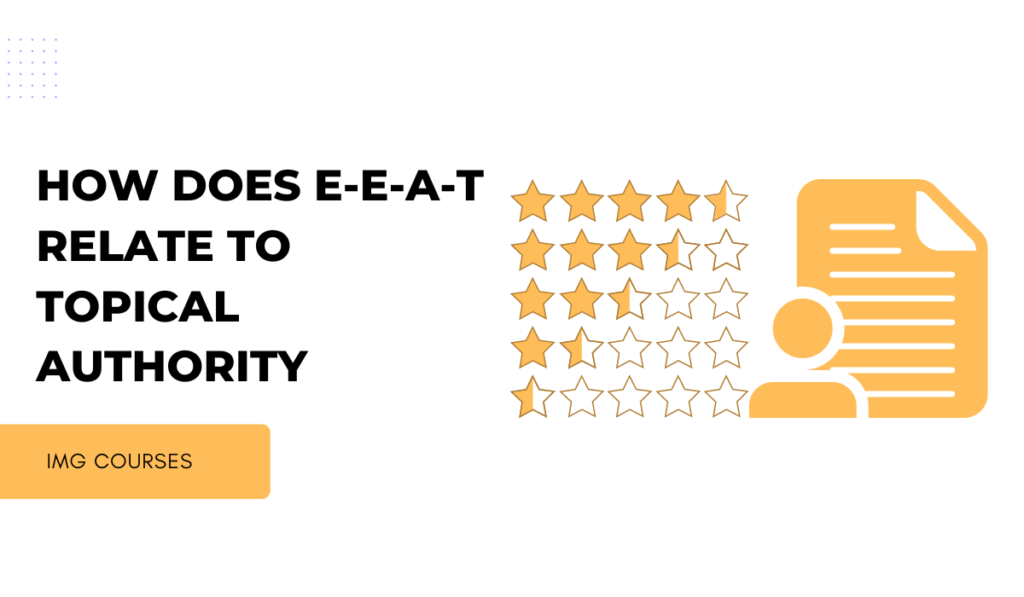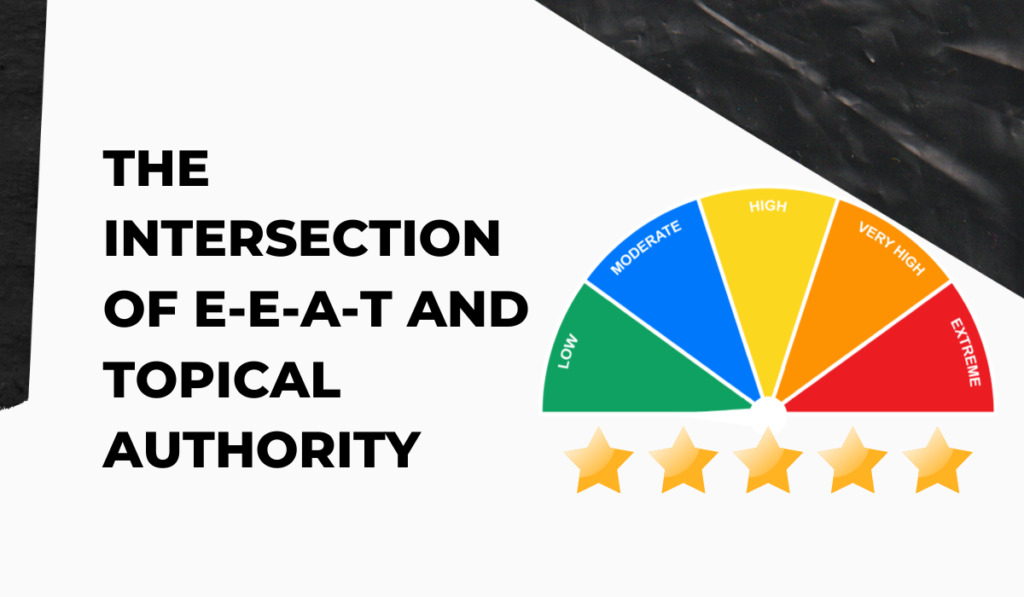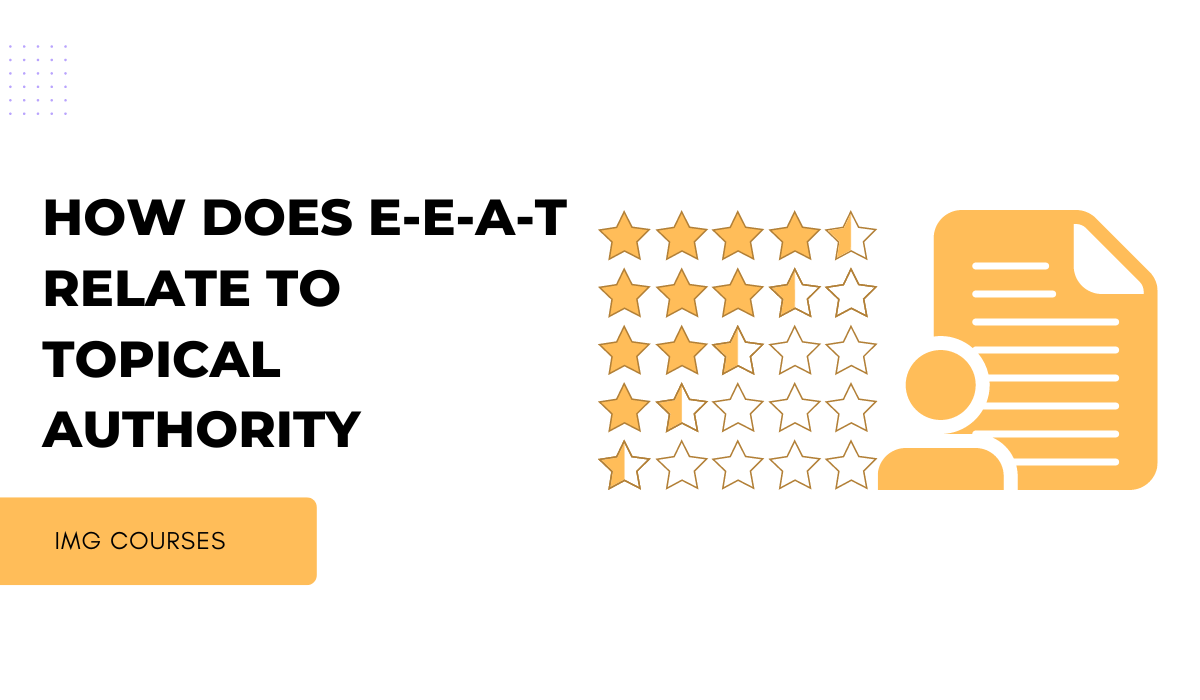
In the ever-evolving world of SEO, two concepts have risen to prominence: E-E-A-T and topical authority. But how does E-E-A-T relate to topical authority, and why should you care?
E-E-A-T, which stands for Experience, Expertise, Authoritativeness, and Trustworthiness, is Google’s framework for evaluating content quality. On the other hand, topical authority is how established you are as an expert in your niche. Together, these concepts form the backbone of modern SEO strategy.
As search engines become more competent, they seek more than just keywords. They want to know that you’re an authority on something specific and that your content is trustworthy. This is where E-E-A-T and topical authority intersect, creating a powerful synergy that can boost your rankings and organic traffic.
This guide will dive deep into these concepts, exploring their relationship and providing actionable strategies to help you dominate the search results. Whether you’re a seasoned SEO pro or just starting, understanding the interplay between E-E-A-T and topical authority is crucial for success in today’s digital landscape.
Understanding E-E-A-T
What is E-E-A-T? At its core, E-E-A-T is Google’s way of ensuring that the content it serves users is high-quality, reliable, and created by genuine experts. Let’s break down each component:
- Experience: This newest addition to the E-A-T framework emphasizes the importance of first-hand knowledge. Google wants to see that content creators have real-world experience with the topics they’re writing about.
- Expertise refers to the depth of knowledge an author or website demonstrates about a particular subject. It’s not just about having information but about showing a comprehensive understanding of the topic.
- Authoritativeness: This is about reputation and recognition within your field. Authority is built over time through consistent, high-quality content creation and recognition from other experts in your niche.
- Trustworthiness: This encompasses the overall credibility of your website and content. It includes factors like site security, transparency about who’s behind the content, and information accuracy.
E-E-A-T will be increasingly important in how Google evaluates and ranks content. According to Google’s Quality Rater Guidelines, human raters use E-E-A-T principles to assess the quality of search results. While these ratings don’t directly affect rankings, they inform Google’s algorithms.
So, how does this relate to topical authority? Topical authority results from consistently demonstrating high E-E-A-T in a specific subject area. You’re building your topical authority by creating content showcasing your experience, expertise, authoritativeness, and trustworthiness in a particular niche.
To build both E-E-A-T and topical authority, consider these strategies:
- Develop comprehensive content that covers all aspects of your chosen topics
- Showcase author credentials and expertise
- Implement robust internal linking to create topic clusters
- Engage in strategic link-building to gain recognition from other authoritative sites
Remember, E-E-A-T and topical authority aren’t about gaming the system. They’re about genuinely becoming a trusted, authoritative source in your niche. By focusing on these principles, you’ll improve your SEO performance and provide real value to your audience.
Defining Topical Authority
What is topical authority? Simply put, topical authority measures your credibility as an expert in your niche. It’s about proving you’re an authority on something specific rather than being a jack-of-all-trades.
Think of it like this: if you’re looking for advice on baking the perfect sourdough bread, would you trust a general cooking website or a dedicated artisan bread blog? You’d go for the specialist. That’s a topical authority in action.
But how does topical authority differ from domain authority? While domain authority is a broader measure of a website’s overall strength, topical authority is focused on expertise in specific subject areas. Here’s a quick comparison:
| Topical Authority | Domain Authority |
| Focused on specific topics | Overall website strength |
| Built through in-depth content | Influenced by general SEO factors |
| Demonstrates expertise in niche | Shows general site credibility |
Building topical authority can do wonders for your SEO efforts. Here’s why it matters:
- Improved search rankings: Search engines love websites with deep knowledge in specific areas.
- Increased organic traffic: More people will naturally seek out your content when you’re seen as an authority.
- Enhanced user trust: Visitors are more likely to trust and engage with content from recognized experts.
So, how do you build topical authority? It’s all about creating comprehensive, relevant content that covers all aspects of your chosen topics. This includes addressing related subtopics and answering common questions in your niche.
Remember, building topical authority isn’t an overnight process. It requires consistent effort and a strategic approach to content creation. However, the payoff regarding SEO performance and user trust makes it worth the investment.
The Intersection of E-E-A-T and Topical Authority

Now that we’ve explored E-E-A-T and topical authority separately let’s dive into how E-E-A-T relates to topical authority. These two concepts are closely linked, boosting your SEO performance and establishing your site as a go-to resource in your niche.
E-E-A-T is the foundation upon which topical authority is built. Here’s how each component of E-E-A-T contributes to establishing topical authority:
- Experience: Sharing first-hand knowledge demonstrates deep involvement in your niche.
- Expertise: In-depth, accurate content showcases your mastery of the subject.
- Authoritativeness: Recognition from other experts in your field reinforces your position as an authority.
- Trustworthiness: Consistently reliable information builds user confidence in your expertise.
By focusing on these E-E-A-T principles, you’re naturally building topical authority. It’s like a virtuous cycle: the more you demonstrate E-E-A-T, the stronger your topical authority becomes, enhancing your perceived E-E-A-T.
So, what can you do to leverage this relationship? Here are some strategies:
- Develop a comprehensive content strategy: Create a content plan that covers all aspects of your chosen topics. This not only demonstrates expertise but also builds topical relevance.
- Highlight expert authorship: Make sure genuine experts create your content. Include author bios that showcase credentials and experience.
- Implement internal solid linking: Link-related content to create topic clusters. This helps search engines understand the breadth and depth of your expertise.
- Engage in strategic link building: Earn backlinks from other authoritative sites in your niche. This not only boosts your domain authority but also reinforces your topical authority.
Remember, Google’s quality rater guidelines specifically look for signs of E-E-A-T when evaluating content. While these human ratings don’t directly affect rankings, they inform Google’s algorithms.
It’s also worth noting that user signals reinforce E-E-A-T and topical authority. When users engage with your content, spend time on your site, and share your pages, it sends positive signals to search engines about the quality and relevance of your content.
E-E-A-T and topical authority are two sides of the same coin. You’re naturally building topical authority by creating high-quality, expert content that adheres to E-E-A-T principles. And as your topical authority grows, it becomes easier to demonstrate strong E-E-A-T. It’s a win-win strategy that can significantly boost your SEO performance and establish your site as a proper authority in your niche.
Strategies for Improving E-E-A-T and Topical Authority
Now that we understand how E-E-A-T relates to topical authority let’s dive into some practical strategies to boost both. Remember, E-E-A-T is not just a buzzword; it’s a framework that can significantly impact your organic traffic and search engine rankings. Here’s how you can do it:
- Conduct thorough keyword and topic research:
- Use tools like Google’s Keyword Planner or SEMrush to identify relevant keywords in your niche.
- Look for long-tail keywords that indicate user intent and questions.
- This research will help you understand what is essential to your audience and guide your content creation.
- Create high-quality, in-depth content:
- Focus on creating comprehensive guides that cover all aspects of a topic.
- Include data, statistics, and expert quotes to support your points.
- Remember, topical authority is about showing that you’re an authority on something specific.
- Implement effective internal linking strategies:
- Create topic clusters by linking related content.
- This helps search engines understand the structure of your site and the breadth of your expertise.
- It also improves user experience by guiding readers to more relevant information.
- Build relevant external backlinks:
- Engage in strategic link-building to earn backlinks from other authoritative sites in your niche.
- Effective tactics include guest posting, creating shareable infographics, or conducting original research.
- Remember, quality over quantity is vital when it comes to backlinks.
- Showcase author expertise and credentials:
- Include detailed author bios that highlight relevant experience and qualifications.
- Link to the author’s other published works or social media profiles.
- This helps demonstrate how established you are as an expert in your niche.
- Regularly update and maintain content freshness:
- Keep your content up-to-date with the latest information and best practices.
- Regularly review and update your cornerstone content.
- This shows search engines that your site is actively maintained and trustworthy.
By implementing these strategies, you’re not just improving your SEO; you’re building a robust foundation of expertise and authority to serve your site well in the long term. Remember, E-E-A-T will continue to be a crucial factor in how search engines evaluate content quality. By focusing on these principles, you’re aligning your SEO efforts with Google’s quality rater guidelines and setting yourself up for long-term success.
Conclusion
As we’ve explored, E-E-A-T and topical authority are intrinsically linked, working together to elevate your SEO game. E-E-A-T is the foundation upon which topical authority is built, showcasing how established you are as an expert in your niche. By focusing on these principles, you’re not just improving your search engine rankings; you’re building a reputation that you’re an authority on something specific.
Remember, E-E-A-T will continue to be a crucial factor in how search engines evaluate content quality. By implementing the strategies we’ve discussed – from creating in-depth content to strategic link building – you can significantly boost your organic traffic and establish yourself as a trusted resource in your field.
The journey to building E-E-A-T and topical authority is ongoing, but the rewards are substantial. So, keep creating, keep learning, and keep demonstrating your expertise. Your audience – and the search engines – will thank you for it.
Ready to take your SEO strategy to the next level? Visit img.courses to access our comprehensive SEO training programs and master the art of E-E-A-T and topical authority building!

